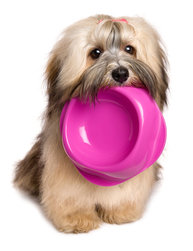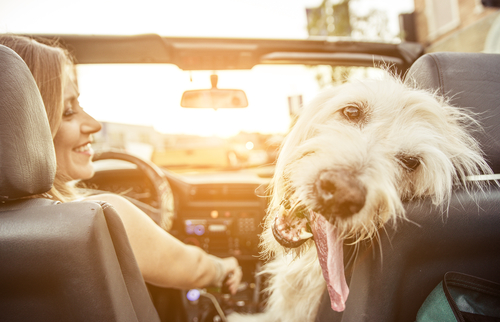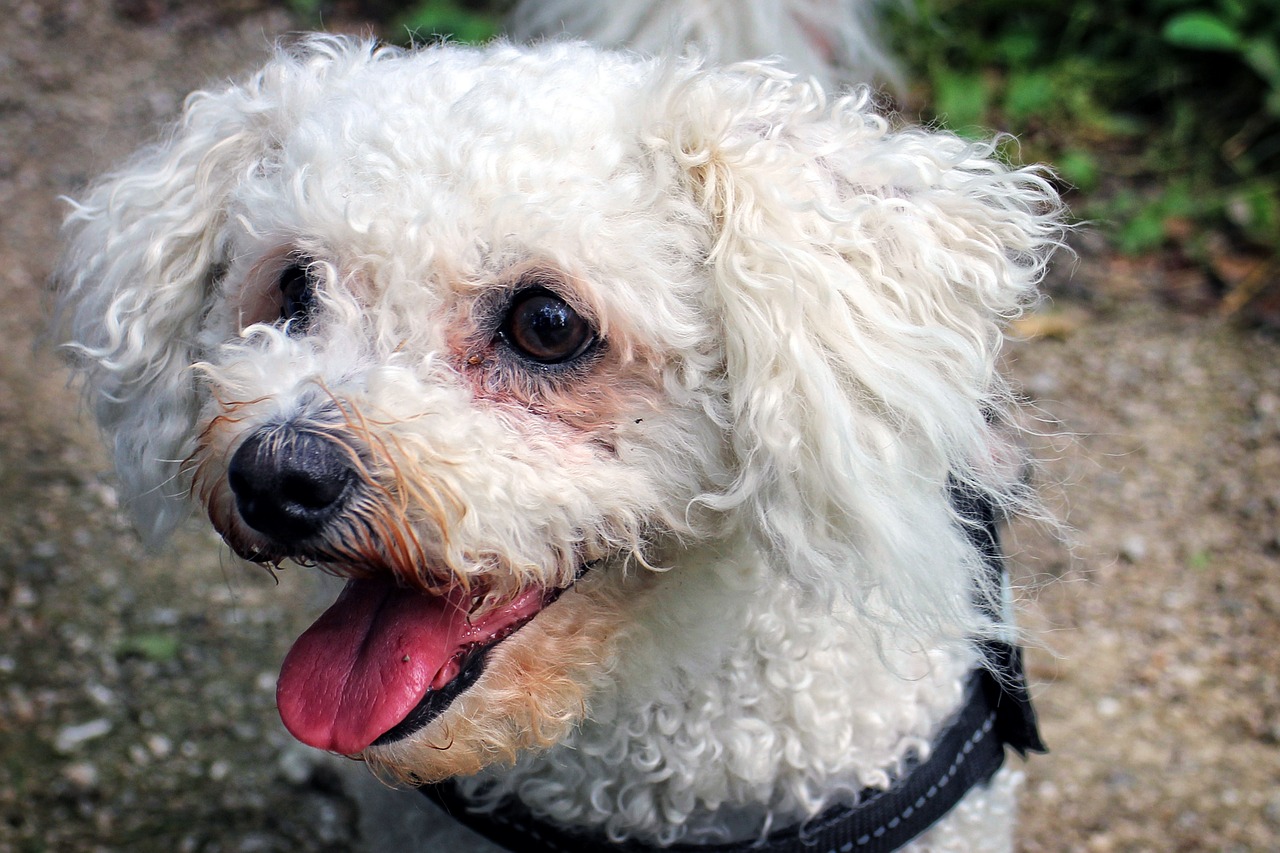Canine constipation, fairly common, is easily corrected in most cases. However, if your dog is constipated and sickly, or has constipation that does not clear up in a day or two, it may be time to go to the vet.
Just like people, dogs vary in their bowel habits. A Bichon Frise dog can have a bowel movement anywhere from three times a day to once every day or two. And, depending on your dog’s normal habits, he can go up to two days without moving his bowels, with no ill effects.

In order to know what is normal for your dog, you’ll just have to observe him over a period of time. This is key to knowing if your dog is actually constipated.
This article will discuss:
- What causes constipation in dogs?
- How to know if your dog is constipated
- What you can do to help your constipated dog
- When dog constipation is serious
What causes constipation in dogs?
Canine constipation can be caused by a number of different things. Here are some of the reasons that your pet may be constipated:
Blockage or obstruction
This is the most common cause of canine constipation. If your dog eats bones, pieces of toys, sticks or little stones, they can cause a blockage because they can’t be digested and they get stuck in the intestines. Sometimes even eating hard things in garbage can cause a blockage.
Hairballs – This is a kind of blockage, but I’m listing it separately because it is quite common. If your dog grooms herself or licks herself a lot, she can actually accumulate enough hair in her intestinal tract to block or partially block it. In this case, nothing gets past the ball of hair.
Not enough water
If your dog does not drink enough water, or she doesn’t have access to water freely, this can cause constipation. You can easily provide a constant supply of water with an automatic water fountain.
Not enough chances to go outside
If your dog has to wait too long to poop, on a regular basis, this can lead to problems with his bowels. If you need to be away from your home for hours at a time, arrange for someone else to let your dog out once or twice during the day.
Diet
Your dog’s diet needs to have sufficient fiber, or constipation can develop. Many dogs do thrive on a BARF or raw food diet, but this diet does not have much roughage.
Exercise
Lack of exercise can lead to constipation.
Medications
Medications can slow down digestion, causing a problem with bowel movements.
Neurological diseases
Sometimes a growth or tumor in the body, outside the intestine, pushes on the intestine to make the opening smaller. Or, the colon loses its muscle strength and can’t push hard enough for your dog to poop properly.
Enlarged prostate or lymph nodes
An enlarged prostate or lymph nodes sometimes partially block the colon. We find this condition in older male dogs.
Tumor
A tumor in the rectal area can put pressure on the rectum and make it difficult for the feces to move through the rectum.
How to know if your dog is constipated
In order to know if your dog is constipated, you have to know what is normal for her. So, before you have a problem, you should be familiar with your dog’s routine. This isn’t hard. Just observe to see how often your dog has a bowel movement and how many times a day.

When a dog is constipated, he will either have infrequent or fewer bowel movements or he will have trouble moving his bowels.
Symptoms of dog constipation include:
- Straining to poop – Your dog is trying to poop, and it isn’t coming out easily.
- Anxiety when trying to go – Your dog may even whine or cry a bit when trying to poop.
- Poop may be thin or ribbon-like in appearance
- Loss of appetite
- Vomiting
- Poop has a foul odor
- Lethargy or no energy
- Abdominal discomfort or pain
If your dog has a simple case of constipation, you’ll be able to handle it. If your dog does not have relief in a day or two, your vet may need to check him. The vet can confirm that there is fecal matter by feeling your dog’s abdomen and doing a rectal exam.
As a pet parent, you should not ignore your dog’s constipation. The longer poop stays in the colon, the drier, harder and more difficult to pass it becomes.
X-rays of the abdomen can confirm that your dog is retaining poop and will show if it contains objects like bone fragments.
Canine Constipation Treatment
If you think that your dog is constipated, you don’t have to take her to the vet right away. Most of the time, the issue is easily handled without taking extreme measures.
There are some simple steps that you can take to treat canine constipation:
Provide plenty of water
Make sure your Bichon Frise is hydrated. You can do this by providing water bowls in several locations, so water is freely available. Dogs like fresh water, so make it appealing by changing your dog’s water often. Another way to make sure your dog is getting plenty of fresh clean water is to use a pet drinking fountain.
Increase fiber
Make sure your dog’s diet has enough fiber, especially if constipation is frequent. Hill’s has a formula for small dogs that has added fiber and is also beneficial for skin issues, common with Bichon Frises. Fiber absorbs poisons, increases fecal bulk (making it easier to move through the intestines), and improves the function of the intestines. You can also add fiber to your dog’s diet by giving her wheat bran, oat bran or psyllium husk powder. Just add a tablespoon per day to your Bichon’s food.
Pumpkin
Pumpkin helps regulate your dog’s bowels and is good for both diarrhea and constipation. You can provide pumpkin easily by giving your dog canned pumpkin or a supplement like this one.
Exercise
Make sure your dog gets some exercise daily. Bichon Frises don’t need lengthy walks or runs every day, but they do need some exercise. Moving around will help your dog’s body function better, so it is easier to poop.
Monitor what your dog eats
Make sure your dog doesn’t eat bones or other objects that can’t be digested. Keep non-food objects that your dog might eat, out of reach.
Stool softener
If your dog has an ongoing problem with constipation, you might want to keep a stool softener on hand so you can give them to your dog, as needed. This one is an example of a softener that can be used as a preventative or when it is needed.
Laxatives
may be prescribed by your vet. A laxative made for dogs can soften the stool and get things moving. However, do not give your dog human laxatives, as they can be very dangerous for dogs to take.
When dog constipation is serious
Occasionally dog constipation is more serious than an occasional inconvenience. If you have taken the steps listed above, and your dog has not had relief in a couple of days, it’s time to consider a visit to the vet.
If your dog is older or has an illness, his constipation can make him feel sicker. And the longer that poop remains in your dog’s intestines, the drier and harder it gets—making it even more difficult to pass.
Dogs with constipation can become quite ill if they do not get relief. And there are some more serious reasons that a dog can have constipation.
When your dog has long term constipation it is called obstipation. If your dog has obstipation, there is probably a more significant problem, and it will need to be handled by your veterinarian.




Leave a Reply